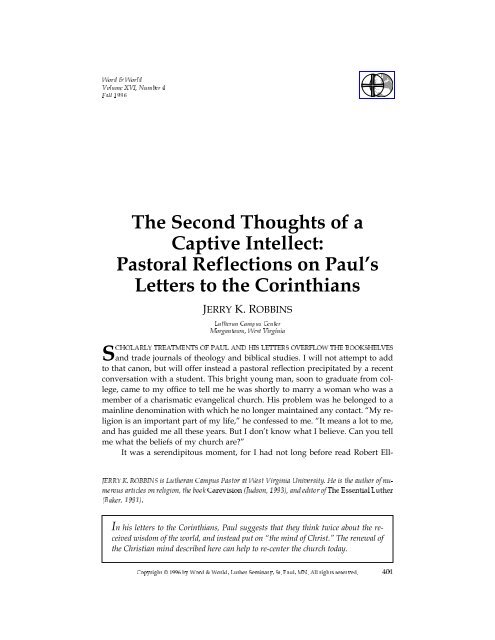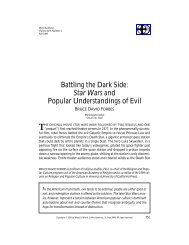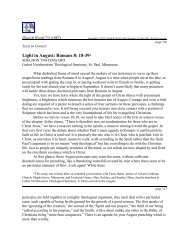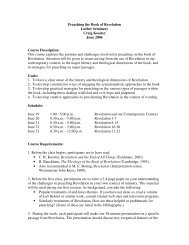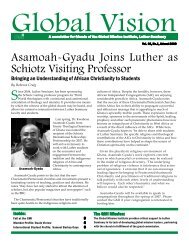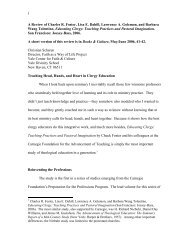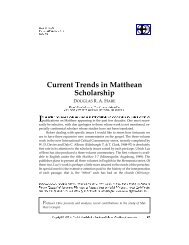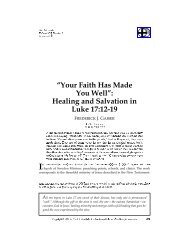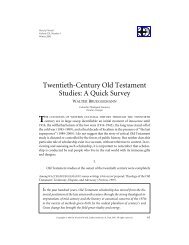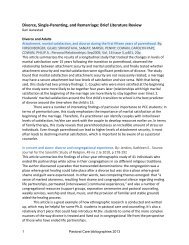The Second Thoughts of a Captive Intellect - Word & World - Luther ...
The Second Thoughts of a Captive Intellect - Word & World - Luther ...
The Second Thoughts of a Captive Intellect - Word & World - Luther ...
Create successful ePaper yourself
Turn your PDF publications into a flip-book with our unique Google optimized e-Paper software.
<strong>Word</strong> & <strong>World</strong>Volume XVI, Number 4Fall 1996<strong>The</strong> <strong>Second</strong> <strong>Thoughts</strong> <strong>of</strong> a<strong>Captive</strong> <strong>Intellect</strong>:Pastoral Reflections on Paul’sLetters to the CorinthiansJERRY K. ROBBINS<strong>Luther</strong>an Campus CenterMorgantown, West VirginiaSCHOLARLY TREATMENTS OF PAUL AND HIS LETTERS OVERFLOW THE BOOKSHELVESand trade journals <strong>of</strong> theology and biblical studies. I will not attempt to addto that canon, but will <strong>of</strong>fer instead a pastoral reflection precipitated by a recentconversation with a student. This bright young man, soon to graduate from college,came to my <strong>of</strong>fice to tell me he was shortly to marry a woman who was amember <strong>of</strong> a charismatic evangelical church. His problem was he belonged to amainline denomination with which he no longer maintained any contact. “My religionis an important part <strong>of</strong> my life,” he confessed to me. “It means a lot to me,and has guided me all these years. But I don’t know what I believe. Can you tellme what the beliefs <strong>of</strong> my church are?”It was a serendipitous moment, for I had not long before read Robert Ell-JERRY K. ROBBINS is <strong>Luther</strong>an Campus Pastor at West Virginia University. He is the author <strong>of</strong> numerousarticles on religion, the book Carevision (Judson, 1993), and editor <strong>of</strong> <strong>The</strong> Essential <strong>Luther</strong>(Baker, 1991).In his letters to the Corinthians, Paul suggests that they think twice about the receivedwisdom <strong>of</strong> the world, and instead put on “the mind <strong>of</strong> Christ.” <strong>The</strong> renewal <strong>of</strong>the Christian mind described here can help to re-center the church today.Copyright © 1996 by <strong>Word</strong> & <strong>World</strong>, <strong>Luther</strong> Seminary, St. Paul, MN. All rights reserved. 401
Robbinswood’s <strong>The</strong> History and Future <strong>of</strong> Faith, 1 in which he predicted the demise <strong>of</strong> formalChristianity and the rise <strong>of</strong> folk religion devoid <strong>of</strong> any doctrinal content. This student,likely following his boomer parents before him, was growing up with a religionwithout traditional content, a faith without historical grounding. Heconsidered himself a religious person, but had lost the foundation or roots <strong>of</strong> hisfaith. He was part <strong>of</strong> a burgeoning generation that claims religious credentialswithout knowing any <strong>of</strong> the principles <strong>of</strong> membership.How can we promote the recovery <strong>of</strong> basic Christian beliefs in the household<strong>of</strong> faith? What can we do to reinstate the core teachings <strong>of</strong> the Christian tradition?<strong>The</strong>re is perhaps no issue more crucial to the survival <strong>of</strong> Christianity than this one.In this essay I want to suggest that, rather than follow the way <strong>of</strong> accommodation—thedeath-strategy <strong>of</strong> the modern mainline church—we need to point out theradical difference between Christian beliefs and the vacuous beliefs <strong>of</strong> the socalled“mental members” <strong>of</strong> organized religion. At the same time we need to showthat Christian faith is not so anomalous as to be meaningless to modern understanding.In particular, I want to propose that in the commonplace notion <strong>of</strong> “secondthoughts” there is a helpful rubric for directing Christian renewal. Christians arepeople who have second thoughts about the received wisdom <strong>of</strong> the world, especiallyits popular religious tenets and piety. A prime illustration <strong>of</strong> this stance isPaul and his writings to the Corinthians. In that correspondence we find the call toa radically new way for the believer to look at self, world, and God—a re-visionthat comprises the second thoughts <strong>of</strong> the Christian consciousness. This proposalis developed in three parts: (1) an exploration <strong>of</strong> the notion <strong>of</strong> second thoughts, (2)a study <strong>of</strong> themes in Corinthians that suggest conceptual revision, and (3) an overview<strong>of</strong> some <strong>of</strong> Paul’s second thoughts as a way <strong>of</strong> re-centering the church .I. SECOND THOUGHTSRecently a book appeared with the intriguing title, Silicon Snake Oil: <strong>Second</strong><strong>Thoughts</strong> on the Information Highway. In this book, Clifford Stoll does an about-facefrom his earlier <strong>The</strong> Cuckoo Egg: Inside the <strong>World</strong> <strong>of</strong> Computer Espionage. 2 Stoll illustratesthe two essential ingredients in second thoughts: the rejection <strong>of</strong> our firstthoughts on a topic, and the reformulation <strong>of</strong> our thinking according to a newevaluation <strong>of</strong> the situation. Clearly, Stoll has reversed his position. At the sametime, he does not give up thinking about the issue. Rather, he collects a whole arsenal<strong>of</strong> arguments against computers, arguments that comprise his secondthoughts on the topic.<strong>The</strong> first step in the dynamics <strong>of</strong> second thoughts is to call into question theinitial thoughts we have on a subject. Some time ago a student said to me, “All mylife I have wanted to be an engineer. Now I’m a senior and I’m having secondthoughts about this. I’m pretty sure this is not what I want to do for the rest <strong>of</strong> my1Robert Ellwood, <strong>The</strong> History and Future <strong>of</strong> Faith (New York: Crossroad, 1988).2Clifford Stoll, Silicon Snake Oil: <strong>Second</strong> <strong>Thoughts</strong> on the Information Highway (New York: Doubleday,1995) and <strong>The</strong> Cuckoo Egg: Inside the <strong>World</strong> <strong>of</strong> Computer Espionage (New York: Doubleday, 1989).402
Pastoral Reflections on Paul’s Letters to the Corinthianslife.” <strong>The</strong> crisis in this student’s life was precipitated by a change in his self-image.<strong>The</strong> picture <strong>of</strong> a lifelong engineer no longer fit who he really was. That image,composed and cultivated by others, shattered and crumbled around him. As it collapsed,he began to rethink what he wanted to do with his life. <strong>The</strong> secondthoughts he was having could occur because his first thoughts were no longervalid or compelling for him.<strong>The</strong> second step is to fill the mind with new thoughts. I have strong memories<strong>of</strong> my first experience <strong>of</strong> whitewater rafting. For months my mind was filledwith positive images and favorable feelings about the coming experience. However,the day <strong>of</strong> the event, things deteriorated rapidly. As we awaited our turn, apark ranger reported how many drownings had recently occurred on the river.Once we put in, our guide lost control <strong>of</strong> her kayak, several people in the groupwere swept overboard and injured, and my son, a reasonable swimmer, becametrapped under our raft and nearly drowned. At that point, I began to re-think howmuch fun I was having. Gradually my first thoughts were replaced with more realisticthoughts that included the dangers and risks in the sport.It is possible to have second thoughts about many things. Central to theChristian life is changing one’s mind about who God is, not because <strong>of</strong> academiccuriosity but a concern for one’s own salvation. A Christian is one whose thinkinghas been interrupted or altered, whose understanding is discontinuous with thedominant religion <strong>of</strong> the marketplace and media-driven masses.<strong>The</strong>mes in Paul’s correspondence with the Corinthians suggest just how themind <strong>of</strong> a Christian is changed.II. THE CHRISTIAN MIND IN CORINTHIANSAlthough Paul does not explicitly argue that the defining mark <strong>of</strong> the Christianis having second thoughts, his Corinthian correspondence contains themes whichsupport that notion. While Paul deals with many practical problems among the Corinthians,it is in that community more than any other that he takes up the issue <strong>of</strong>maintaining correct beliefs in the midst <strong>of</strong> an alien or errant culture. It is with the Corinthiansthat he worries about “false apostles” (2 Cor 11:13) who spread a “differentgospel,” or teach about “another Jesus” (2 Cor 11:4) . It is to the Corinthians that hewrites, “Examine yourselves, to see whether you are holding to your faith. Test yourselves”(2 Cor 13:5). And the way he encourages proper faith among the Corinthiansis to admonish them to reconsider some <strong>of</strong> the claims to truth that are being made inthe society around them, and perhaps even within their own fellowship. He urgesthem to exercise some reflection and reserve toward these popular teachers andteachings, to think twice about what they are saying.<strong>The</strong> context in which Paul passes on this instruction to the Christians at Corinthis “the wisdom <strong>of</strong> the world” (1 Cor 1:20) that pervaded Corinth. <strong>The</strong> exact nature<strong>of</strong> this worldly wisdom has been extensively debated by biblical scholars, butthe scene that Paul encountered at Corinth probably included a congeries <strong>of</strong>ideas and doctrines. Of course, “wisdom” had a respectable meaning derived fromits development in Hebrew history. But it is worldly wisdom that Paul must deal403
Robbinswith at Corinth. Given the cosmopolitan nature <strong>of</strong> the city, this could have includedmany traditions, movements, and schools, both religious and nonreligious.Among the unbelievers <strong>of</strong> the city would possibly have been those whoadopted one <strong>of</strong> the Greek philosophies. Surely there were some caught up in theimperial cult promoted by Tiberius, and the worship <strong>of</strong> the deities <strong>of</strong> the Romanstate. Others paid homage to the gods and goddesses <strong>of</strong> Greece, or the deities <strong>of</strong>other foreign cults. Indeed, just before his visit to Corinth Paul had unsuccessfullypreached about the “unknown god” <strong>of</strong> Athens (Acts 17:16-34).Or was Paul addressing Christian believers who as former Jews were boastingin the Torah, or as zealots or super-Christians were smug in their new spiritualenlightenment that assured them they were already resurrected and already in thekingdom? Perhaps Paul had in mind colleagues or personal opponents, otherpreachers and teachers, who claimed a more eloquent and persuasive theologyand preaching.It is against the background <strong>of</strong> a formidable conceptual scaffolding <strong>of</strong> pluralism,secularism, and intellectualism that Paul writes. In effect, he suggests to theCorinthians that they might want to reconsider or develop some second thoughtsabout this worldly wisdom. It is possible to extract three themes in his advice thatpoint in this direction.1. Surrender your thoughts to Christ.First, Paul calls on the Corinthians to take their thoughts captive to Christ (2 Cor10:5). Clarence Jordan provides an interesting translation:For even though we live in the world, we do not fight on its level. Our implements<strong>of</strong> war are not manufactured by the world but loaded by God for smashingfortresses. With them we explode learned discourses and every highfalutinwisecrack against the true knowledge <strong>of</strong> God. With them we capture every ideaand make it obey Christ. 3Jordan’s emphasis on knowledge and eloquence is suggestive. Margaret Thralltranslates verse five in this way: “We demolish sophistries and all that rears itsproud head against the knowledge <strong>of</strong> God; we compel every human thought to surrenderin obedience to Christ.” 4While the range <strong>of</strong> Paul’s assault may be much broader or on another front,some scholars argue that his attack is precisely against intellectual brigands. <strong>The</strong>issue is “the seductive reasonings, i.e., sophistries and plausible fallacies withwhich Jews and Gentiles evaded the teaching <strong>of</strong> the Apostles.” 5 Or, more directlyrelating to Paul’s work, “the strongholds which are demolished are the reasonings<strong>of</strong> those who would subvert the work <strong>of</strong> the Pauline apostolate.” 6 What Paul is3Clarence Jordan, <strong>The</strong> Cotton Patch Version <strong>of</strong> Paul’s Epistles (New York: Association, 1968) 87.4Margaret E. Thrall, First and <strong>Second</strong> Letters <strong>of</strong> Paul to the Corinthians (Cambridge: Cambridge University,1965) 166.5Alfred Plummer, A Critical and Exegetical Commentary on the <strong>Second</strong> Epistle <strong>of</strong> St. Paul to the Corinthians(Edinburgh: T &T Clark, 1985) 276.6Victor Paul Furnish, II Corinthians. ( New York: Doubleday, 1984) 458. See also Ralph Martin,<strong>Word</strong> Biblical Commentary Vol. 40, 2 Corinthians (Waco: <strong>Word</strong>, 1986) 305-306.404
Pastoral Reflections on Paul’s Letters to the Corinthiansafter are the “ideas and opinions” that may turn people aside from the truth inChrist. 7 Paul’s weapons were meant to “destroy the way people think, demolishtheir sinful thought patterns, the mental structures by which they live their lives inrebellion against God.” 8 In short, Paul is calling for some reconsideration <strong>of</strong> “thearguments...in which people fortify themselves against the invasion <strong>of</strong> the knowledge<strong>of</strong> God (the gospel).” 9<strong>The</strong> effect <strong>of</strong> Paul’s spiritual arming is a deadly blow against worldly wisdom,in two stages. First, it involves the destruction <strong>of</strong> worldly wisdom. Adept atusing imagery from the ordinary world, Paul employs a military metaphor thatwould have been well known in Greco-Roman circles. <strong>The</strong> demolition in siegewarfare <strong>of</strong> a city’s walls, bulwarks, or ramparts, and the heavily guarded strongholdswithin, would have been a familiar image to Corinthians under Roman rule.Describing the resistance as “the proud obstacle” also would have called to mindthe high towers from which the soldiers would defend their city.<strong>Second</strong>, the assault involves making prisoners <strong>of</strong> those who have been overcome,namely all the militia <strong>of</strong> worldly wisdom, all the “human thoughts” that are“the enemy soldiers.” 10 Perhaps recalling what it meant to be a captive to the enemy,sin (Rom 7:23), Paul now turns the tables and suggests the time has come totake captive all those ideas that lead believers astray, all those teachings that lurethe righteous into the pathways <strong>of</strong> false beliefs. Paul does not counsel irrationality—apoint well made by many biblical scholars. Yet to introduce notions <strong>of</strong>bondage, slavery, and imprisonment is an extraordinarily strong move for Paul.Perhaps it is his zeal for God such that “anything that conflicts with divine interestsand the claims <strong>of</strong> Christ is within the range <strong>of</strong> his artillery.” 11 Perhaps he isthinking <strong>of</strong> his own captivity, the sacrificial aroma <strong>of</strong> his suffering for God (2 Cor2:14-16). Perhaps it is because he so celebrates and covets the liberty <strong>of</strong> the gospel(1 Cor 15:54-57; Rom 6:14) that he can speak <strong>of</strong> locking up the enemy and “punishing”the disobedient. In any case, Paul is an impassioned teacher charging the Corinthiansto bring their thoughts under control, to collar whatever ideas lead themaway from Christ, to put a clamp on any speculations that would replace the gospel.2. Know only Christ crucified.According to Paul, the Christian cannot think anything he or she wants. Afterrendering harmless any religiously criminal thoughts, the believer must nextfill her or his consciousness with the correct thoughts. Paul describes the proper7Ernst Best, <strong>Second</strong> Corinthians. (Atlanta: John Knox, 1987) 93.8Donald A. Carson, From Triumphalism to Maturity: An Exposition <strong>of</strong> 2 Corinthians 10-13 (GrandRapids: Baker 1984) 47.9Colin G. Kruse, <strong>The</strong> <strong>Second</strong> Epistle <strong>of</strong> Paul to the Corinthians: An Introduction and Commentary(Grand Rapids: Eerdmans, 1995) 174.10Robert G. Bratcher, A Translator’s Guide to Paul’s <strong>Second</strong> Letter to the Corinthians (London: UnitedBible Societies, 1983) 106.11Frederick W. Danker, Augsburg Commentary on the New Testament: II Corinthians (Minneapolis:Augsburg, 1989) 153.405
Robbinscontent: “For I decided to know nothing among you except Jesus Christ and him crucified”(1 Cor 2:2). Others in the community claimed to know very much more. <strong>The</strong>ywere wise in their knowledge <strong>of</strong> the law, or rich with the guidance <strong>of</strong> the Spirit, orfull <strong>of</strong> the wisdom that allegedly assures salvation. As a learned Jew, Paul certainlyhad command <strong>of</strong> a great arsenal <strong>of</strong> knowledge. But he decided to knownothing but the crucified Christ. To make his point, Paul cleared his mind <strong>of</strong> allthoughts except thoughts <strong>of</strong> his Lord’s self-sacrifice. This became the sole content<strong>of</strong> his thinking and behavior. And he expected the Corinthians to follow him inthis discipline.It can be said that Paul was a man with one thing on his mind in the sensethat all his thinking and acting turned around one center. Although he was not asystematic theologian, his work had the order and unity <strong>of</strong> a system with a singularfocus. That center was the reality <strong>of</strong> the cross. It was the cross that empoweredhis mission to the Corinthians. <strong>The</strong> cross is at the forefront <strong>of</strong> his message: “Wepreach Christ crucified” (1 Cor 1:23). <strong>The</strong> cross is the mold in which he shaped hisChrist-mysticism. Paul believed that conversion to Christianity meant that an ordinaryperson became a Christ-like being. <strong>The</strong> operative principle in this changewas the crucifixion/resurrection or death/rebirth <strong>of</strong> the devotee (Phil 3:8-11).Thus Paul said <strong>of</strong> himself, “I have been crucified with Christ; it is no longer Iwho live, but Christ who lives in me” (Gal 2:20). When he wrote, “Christ in you,the hope <strong>of</strong> glory” (Col 1:27), he probably meant that the death/resurrection <strong>of</strong>Christ taking place within the human being is the hope <strong>of</strong> the believer. Both baptismand the Lord’s supper (1 Cor 11:23-26; Rom 6:4-11) incorporated the believerinto the drama <strong>of</strong> the cross. Believers are those who have died to their old nature(Col 3:3; 2 Cor 5:14). <strong>The</strong>y are the ones who share in Christ’s sufferings (2 Cor 1:5; 1<strong>The</strong>ss 1:6), beginning with Paul who is a sacrificial aroma to God (2 Cor 2:14-16).<strong>The</strong> drama <strong>of</strong> dying and rising is the inescapable rhythm <strong>of</strong> the Christian life. <strong>The</strong>believer carries in his or her body “the death <strong>of</strong> Jesus, so that the life <strong>of</strong> Jesus mayalso be manifested”(2 Cor 4:10).<strong>The</strong> cruciform life <strong>of</strong> the believer includes the mind or cognitive/deliberativecenter <strong>of</strong> his or her human nature. And the sign that one’s being is wholly “inChrist” is an openness to and understanding <strong>of</strong> the “wisdom <strong>of</strong> God.” <strong>The</strong> wisdom<strong>of</strong> God is the content that Paul wants the Corinthians to embrace, rather thanthe wisdom <strong>of</strong> the world. This will not be easy, for not many are wise in this wisdom(1 Cor 2:8). It is a stumbling block to the Jews and folly to the Gentiles (1 Cor1:22-24). Its <strong>of</strong>fense lies in the fact that it contains God’s plan <strong>of</strong> salvation, a planthat culminates in the crucified Christ. As such it is a hidden wisdom known onlyby the spiritual person (1 Cor 2:6-16). To the world it is nonsense and a scandal,but for believers it is a precious truth whose keynote is the cross.In putting himself forth as an example for the Corinthians to imitate (1 Cor4:16-17), especially his being “in Christ” through suffering, Paul helps us today togain some insight into the debate about whether he was anti-intellectual or consortedwith the thought patterns <strong>of</strong> his day. In his thinking about salvation, Paulwill know nothing but the crucified Christ. But Paul certainly will continue to406
Pastoral Reflections on Paul’s Letters to the Corinthianstraffic with the thoughts and reasonings <strong>of</strong> the learned culture around him. In fact,he will incorporate some <strong>of</strong> the ideas and arguments from the intellectual milieu inhis writings. He will be “all things to all men” (1 Cor 9:22), employing the imagesand allusions <strong>of</strong> his time in order to make his point.Yet his point in all this will be that, whatever the case before, now Christ isour wisdom (1 Cor 1:30). Paul does not think or write in a vacuum. <strong>The</strong> learning <strong>of</strong>the day is part <strong>of</strong> his heritage. But he orders his knowledge in such a way that whatGod has done to redeem the world is foremost in all his reasoning. That is the oneassumption without which he will not engage in any discussion or debate. Everythinghe thinks and does issues from that premise. He will know only Christ crucifiedin the sense that all <strong>of</strong> this knowledge will operate with that principle at itshead. Not only his speaking, but all his understanding will now be informed by“words not taught by human wisdom but taught by the Spirit” (1 Cor 2:13).Paul urges the Corinthians to imitate his life and his manner <strong>of</strong> thinking. Betweenthe lines <strong>of</strong> his discussion <strong>of</strong> wisdom, discerning readers will hear his counselthat they take their first thoughts, comprised <strong>of</strong> all the popular religiousknowledge <strong>of</strong> the day, and put them in second place in their thinking. He writesthat those who think they are wise should become as fools (1 Cor 4:10), which issaying, in effect,You once thought such and such a way, but I entreat you to think in a new way.Place all that worldly wisdom out <strong>of</strong> your minds, or at least put it far away in acorner <strong>of</strong> your mind. It is my desire that all faithful believers put away falsehood(Eph 4:25). So you, too, must put aside all influences that distract you from yourdevotion to the true God (2 Cor 6:14-16), and bring to the forefront <strong>of</strong> your thinking,replenish the content <strong>of</strong> your minds, with the wisdom <strong>of</strong> God.Ever full <strong>of</strong> practical advice for the Corinthians, Paul urges them forward intheir thinking also. Just as their situation in the world must be adjusted by their allegianceto Christ (2 Cor 7:1), so they must make their thinking holy. His intent is apeople who have learned the art <strong>of</strong> second thoughts. <strong>The</strong>y are to be a changed peoplewith renewed minds (Rom 12:1-2). <strong>The</strong> nature <strong>of</strong> that renewal comprises a thirdtheme one can find in Paul’s writings to the Corinthians.3. Put on the mind <strong>of</strong> Christ.By his writings and example, Paul describes the Christian as a person whohas both taken his or her mind captive to Christ, and has determined to know onlyChrist crucified. Finally, Paul says that a Christian is one who has put on “the mind<strong>of</strong> Christ” (1 Cor 2:16). In this text, Paul is contrasting the foolish pride <strong>of</strong> theunspiritual man with the superior position <strong>of</strong> the spiritual man who has “the mind<strong>of</strong> Christ.” His phrase, “the mind <strong>of</strong> Christ,” makes an important contribution toour thesis. <strong>The</strong> believer does not just discipline or direct the mind as pointed out inthe previous section. As there is a dying and rising with Christ in the general pattern<strong>of</strong> discipleship, so there is a resurrection <strong>of</strong> the mind. <strong>The</strong> believer is buriedwith Christ so that he or she may be raised with Christ. This includes a new life <strong>of</strong>the mind, a life supplied by the indwelling Christ.Of course it is not unusual for Paul to talk about putting on Christ (Gal 3:27).407
RobbinsBut what does he mean by his focus on putting on the mind <strong>of</strong> Christ? In ancientthought, the mind was <strong>of</strong>ten identified with the heart as the moral and spiritualcenter <strong>of</strong> a person. Thus, the mind that we are to have among us is a spirit <strong>of</strong> humilityand service (Phil 2:5-11). To put on the mind <strong>of</strong> Christ is to put on a life <strong>of</strong>holiness. To “set your mind on the things that are above” is to seek the higher path<strong>of</strong> a noble morality (Col 3:2, 12-17). To have the mind <strong>of</strong> Christ is to give up childishways for the maturity demanded by love (1 Cor 13:11-13). It is to seek the good<strong>of</strong> the community or fellowship <strong>of</strong> the faithful as this is nurtured by the Holy Spirit(1 Cor 1:9; 10:16-17; 2 Cor 13:14). Indeed, much <strong>of</strong> the Corinthian correspondenceis about putting on the mind <strong>of</strong> Christ in this sense.But Paul, well educated and exposed to the ideas <strong>of</strong> the learned culturearound him, may well intend something more by his particular phrasing. In biblicalcontext, the mind is not a brain exclusively engaged in thought. But there is arational, contemplative part <strong>of</strong> the unified self. Even though “spirit” is the preferredtranslation <strong>of</strong> 2:16 for some commentators, others suggest “mind” shouldbe rendered: “we think the way Christ does.” 12 Morna D. Hooker’s commentaryon Phil 2:5, “Let this mind be in you, which was also in Christ Jesus,” sides withthe commentators who expand the notion <strong>of</strong> imitation to include not just behavinglike Jesus but having the “mind and attitude which belongs to him.” 13 While anotherword for mind is spirit, it is the thoughts <strong>of</strong> Christ that are revealed by theSpirit. 14 In writing about the mind, then, did Paul want to give importance to an intellectualor cognitive side <strong>of</strong> the Christian life?<strong>The</strong> notion <strong>of</strong> a mind and its thoughts was not unknown in biblical times.Certainly the concept <strong>of</strong> understanding or comprehending was familiar to Paul (1Cor 13:12; 2 Cor 2:11; Rom 1:20). <strong>The</strong> agent <strong>of</strong> this understanding was the mind,and while Paul <strong>of</strong>ten links the mind to the heart or will (1 Cor 1:10; Eph 4:18-19), healso contrasts it with the spirit (1 Cor 14:14-15). 15 Although to come to one’s rightmind means to sin no more (1 Cor 15:34), faithfulness pays dividends to themind also, for it is enabled to see “the light <strong>of</strong> the gospel,” “the light <strong>of</strong> theknowledge <strong>of</strong> the glory <strong>of</strong> God in the face <strong>of</strong> Christ” (2 Cor 4:4-6). Indeed, theChristian life is distinct in its new knowledge which, even though it is about the“depths <strong>of</strong> God” (1 Cor 2:10; Eph 1:17-18), is still a content in the mind. That isto say, even though the renewal <strong>of</strong> the mind through the mind <strong>of</strong> Christ is a recovery<strong>of</strong> “moral judgment,” it entails a revamped “perspective proper to theNew Man” in Christ. 16<strong>The</strong> importance <strong>of</strong> the intellectual life for Paul is suggested also in his concern12Paul Ellingworth and Howard A. Hatton, Paul’s First Letter to the Corinthians (New York: UnitedBible Societies, 1994) 64.13Morna D. Hooker, A Preface to Paul (New York: Oxford, 1980) 79-80.14Gordon H. Clark, “Wisdom in First Corinthians,” Journal <strong>of</strong> the Evangelical <strong>The</strong>ological Society 15(Fall 1972) 205.15D. E. H. Whiteley, <strong>The</strong> <strong>The</strong>ology <strong>of</strong> St. Paul (Philadelphia: Fortress, 1966) 43.16Jerome Murphy-O’Connor, Becoming Human Together: <strong>The</strong> Pastoral Anthropology <strong>of</strong> St. Paul (Wilmington:Glazier, 1984) 212-13. My italics.408
Pastoral Reflections on Paul’s Letters to the Corinthiansthat Christians know what they believe. Even though Paul does not seem to affirmthe gnostic belief that salvation requires a special knowledge, specially received,he does claim that Christian belief includes knowledge. Some <strong>of</strong> the more theologicalteachings a believer should know are: the relationship <strong>of</strong> Christ to the cosmicpowers (1 Cor 8:4-6; Col 1:15-20), the place <strong>of</strong> man in the universe (Rom8:18-25), the meaning <strong>of</strong> Christianity among the religions (Rom 1-3), the varietyand value <strong>of</strong> gifts <strong>of</strong> the spirit (1 Cor 12-14), and the nature <strong>of</strong> the resurrection <strong>of</strong>the dead (1 Cor 15). Also, the importance <strong>of</strong> correct knowledge to Paul is evidentin his struggles with false knowledge and false teachers (1 Cor 1:17-25; 2 Cor11:12-15; Col 2:8). As well, Paul seems to have religious knowledge in mind whenhe writes about overcoming ignorance or increasing understanding (1 Cor 10; 12:1;Rom 11:25; 1 <strong>The</strong>ss 4:13).III. PAUL’S SECOND THOUGHTS AND CHURCH RENEWALPaul’s theology <strong>of</strong> rational revision is a therapy the church needs for its renewal.This becomes more evident when we add to the themes already notedPaul’s explicit call to the Corinthians that they think again about some <strong>of</strong> theirideas and behavior. Already on the mission field fifteen years, including a stay <strong>of</strong>eighteen months at Corinth, Paul describes the Christians at Corinth as his children,and his relationship to them as that <strong>of</strong> a father (1 Cor 4:15). Like any disappointedparent, his tone can be harsh, especially in the biting irony <strong>of</strong> his “painfulletter” (2 Cor 10-13). However, I like to think <strong>of</strong> his approach as similar to manyparents who want to be good mentors. He sits with them in his letters, as it were,and encourages them to reconsider what they are doing.For example, they are to think again about how the pagan cults separate moralityfrom religion, and, with their new thoughts on the matter filling their minds,they are to follow Christ in holiness and purity (1 Cor 5:1, 11; 6:9-10, 15, 18). Pauladmonishes the Corinthians to rethink their attitude toward possessions. <strong>The</strong>y areto “buy as though they had no goods” (1 Cor 7:30), remembering that in Christthey possess everything (2 Cor 6:10). Rather than live in judgment upon each otheror take each other to court (1 Cor 6:1-6), they are to forgive one another (2 Cor2:5-11). <strong>The</strong>y are to think twice about the maxim, “All things are lawful.” <strong>The</strong>y areto treat their body as holy rather than abuse it as though it were somehow separatefrom the spirit (1 Cor 6:12-20).Some people were claiming that speaking in tongues was a more excellentway. Paul suggests that they think about it, and consider that words <strong>of</strong> edificationmay be better (1 Cor 14:1-19). <strong>The</strong>re were some among the Corinthians who didnot believe in the resurrection <strong>of</strong> the dead. Paul advises that they think through thismatter again in light <strong>of</strong> the resurrection <strong>of</strong> Jesus Christ (1 Cor 15). Paul asks that theyreverse their attitude <strong>of</strong> disdain toward servanthood, and adopt love as their modusoperandi (1 Cor 13). Most important, Paul calls the Corinthians to take a secondlook at suffering. Usually interpreted as evidence <strong>of</strong> sinfulness and God’sjudgment, suffering is the badge <strong>of</strong> faithfulness to God (2 Cor 4:7-14; 1 Cor 4:9-13).409
RobbinsThis means that the Corinthians also should shake up their thinking about what isreal in the world and what is mere appearance (1 Cor 7:31; 2 Cor 4:16-18).Paul’s advice for the Corinthians is rooted in a basic revision in his ownthinking: “From now on, therefore, we regard no one from a human point <strong>of</strong> view;even though we once regarded Christ from a human point <strong>of</strong> view, we regard himthus no longer” (2 Cor 5:16). Paul once thought <strong>of</strong> the lowly life <strong>of</strong> Jesus and hisshameful crucifixion as evidence that God had disowned him. But in this writing,he thinks <strong>of</strong> Christ as Savior deserving our full allegiance. Jesus from a humanpoint <strong>of</strong> view is a failure, but in faith he is the one in whose face we see God (2 Cor4:6). For this reason, Paul could admonish the Corinthians to think twice aboutthose who teach a theology <strong>of</strong> glory and who encourage Christians to cultivatesigns <strong>of</strong> power and status (1 Cor 4:8-13). <strong>The</strong> crucial turning point in all this is adifferent way <strong>of</strong> looking at the cross.Paul could have second thoughts about the cross because <strong>of</strong> his own conversionexperience. His encounter with the risen Lord was the beginning <strong>of</strong> a dying/risingpattern that would come to dominate all his thinking and writing. Histemporary blindness is a symbol <strong>of</strong> the trauma that shattered his old way <strong>of</strong> thinkingand led to his resurrection or re-seeing in the light <strong>of</strong> his faith in Jesus Christ.Although Paul’s conversion was not so much a move from no religion to religion,but a metamorphosis within his religious consciousness that did not completelyvoid his past, the event effected such a radical reversal <strong>of</strong> his understanding thatthe cross became the controlling formula for his life. We see this change especiallyin 2 Corinthians where it is reported that he became a servant (4:5) who wouldnot commend himself (5:12), or take gifts for his labors (11:7-11). He played thefool (12:11, also 1 Cor 3:18; 4:10), envisioning triumph in the midst <strong>of</strong> failure(2:14), and describing the fate <strong>of</strong> the servant <strong>of</strong> God in painfully paradoxicalterms (6:9-10). 17Paul suffered the loss <strong>of</strong> all things in order to know Christ (Phil 3:8). This ishis message to a church in search <strong>of</strong> renewal. William Barclay writes,<strong>The</strong> word for penitence or repentance is metanoia....<strong>The</strong> meaning <strong>of</strong> metanoia isclear; it means an after-thought. Meta is afterwards and noia is a thought....Originallyand by derivation, metanoia simply meant the condition in which a manhad second thoughts about something. 18If second thoughts are a possible rubric for renewal in the church, repentance is thenecessary prior condition or concomitant attitude to second thoughts. Paul’s writingsto the Corinthians suggest that the church today, as in the first century, willrecover its beliefs when it faces two <strong>of</strong> its most deadly foes, secularism and fanaticism.<strong>The</strong> church will learn to think correctly when it repents <strong>of</strong> all its allianceswith the world. William Baird describes Corinthian secularism as “the temptation17C. K. Barrett, A Commentary on <strong>The</strong> <strong>Second</strong> Epistle to the Corinthians (New York: Harper & Row,1973) 48-49.18William Barclay, Turning to God: A Study <strong>of</strong> Conversion in the Book <strong>of</strong> Acts and Today (Philadelphia:Westminster, 1964) 47-48.410
Pastoral Reflections on Paul’s Letters to the Corinthiansto conform to the patterns <strong>of</strong> the world.” 19 <strong>The</strong> church today is plagued by thesame temptation. Indeed, it was the “patterns <strong>of</strong> the world” that highjacked thestudent who came to my <strong>of</strong>fice looking for his beliefs. He was overwhelmed by allthe ideas that churn in the secular and academic cauldron and impinge on consciousness,but have nothing to do with the Christian vision <strong>of</strong> reality. Whatwould Paul have to say to a church that has taken on many <strong>of</strong> the values <strong>of</strong> the societyaround it, including its marketing, self-maintenance, and entertainment principles?Paul’s words to the Corinthians, calling them to think again about wherethey are going, are painfully relevant to the church today.<strong>The</strong> second step the church should consider for its recovery is to reclaim theknowledge central to its life. <strong>The</strong> other danger to Christianity today is a fanaticismin which faithful knowledge is overcome by unenlightened enthusiasm. It couldbe argued that the above-noted “folk religion” described by Robert Ellwood is theearly stage <strong>of</strong> this extreme. Paul’s theology <strong>of</strong> rational renewal does not encouragefanaticism, but a hope for fuller understanding (1 Cor 13:12). He would rather instructintelligibly than speak impressively (1 Cor 14:19). His writings prescribe anagile rationality and a resurrection <strong>of</strong> the mind, not its removal. Only people whothink can be admonished to have second thoughts, and thoughts remain in the end,even though they have been rehabilitated.This is an important detail. <strong>The</strong> position <strong>of</strong> the believer is not anti-rational oranti-intellectual. <strong>The</strong> sacrifice <strong>of</strong> first thoughts does not lead to a mindless religion.It is more like the rethinking Jesus called for when he taught using the formula,“You have heard it was said... But I say to you” (Matt 5:21-48). Jesus left his listenerswith plenty to think about. <strong>The</strong> believer is a person who has given up one kind<strong>of</strong> thinking for a different kind <strong>of</strong> thinking. <strong>The</strong> value in the rubric <strong>of</strong> secondthoughts is precisely at this point. <strong>The</strong> thoughts <strong>of</strong> a believer have been radicallyrenovated, but they are thoughts, nevertheless.This means that the believer ends up with important ideas in his or her mind.Another term for second thoughts is “faith.” While faith means a commitment andrelationship, it also has to do with the beliefs in a mind that has had secondthoughts, a mind that has been changed by the Holy Spirit. Paul commends theEphesians for “their faith in the Lord Jesus Christ,” and then goes on to talk aboutknowledge and enlightenment about Jesus’ exaltation through his death and resurrection(1:15-23). For Paul “the word <strong>of</strong> faith” is “the knowledge <strong>of</strong> Christ”(2 Cor2:14; 4:6).<strong>The</strong> result <strong>of</strong> Paul’s advice to the Corinthians, and his example, is a body <strong>of</strong>beliefs that define the Christian consciousness. Some <strong>of</strong> these ideas are: (1) thespirit <strong>of</strong> Christ reveals the ways <strong>of</strong> God to us (1 Cor 2:12, 16); (2) our life is rootedand grounded in God our Creator and the Lord Jesus Christ (1 Cor 8:6); (3) we seethe glory <strong>of</strong> God in the face <strong>of</strong> Jesus Christ (2 Cor 4:6); (4) the key to the power andwisdom <strong>of</strong> God is the crucified Christ (1 Cor 1:23); (5) all things are yours and you19William Baird, <strong>The</strong> Corinthian Church: A Biblical Approach to Urban Culture (New York: Abingdon,1964) 89.411
Robbinsare Christ’s (1 Cor 3:22-23); (6) we are secure in God’s grace alone (1 Cor 10:1-5); (7)through Christ we are made righteous before God (2 Cor 5:21); (8) at the Lord’ssupper the bread is the body <strong>of</strong> Christ, the wine is the blood <strong>of</strong> Christ (1 Cor 11:23-26); (9) the church is like the human body; it is one organism with many members(1 Cor 12:14-31); (10) we should exhibit self-forgetfulness so that by dying withChrist we shall also live with him (2 Cor 5:14-15); (11) bear your burdens bravely,for in that way you testify to the life <strong>of</strong> Jesus in you (2 Cor 4:7-11); (12) wheneveryou are uncertain, choose love over knowledge (1 Cor 8:1-13); (13) to be a Christianlive “in Christ” (1 Cor 3:1); (14) travel lightly through this world—it is passingaway (1 Cor 7:29-31); (15) things are not what they seem, especially with regard tothe power <strong>of</strong> evil (1 Cor 15:24-26); (16) we live in a new era in which God’s reignhas begun (2 Cor 5:17); and (17) in the resurrected Christ all will be made alive (1Cor 15:20-22).During his last visit to Corinth, Paul began a correspondence with the Christiansat Rome. <strong>The</strong> letter to the Romans is <strong>of</strong>ten given preeminent place in the NewTestament. <strong>The</strong> Romans could have thanked the Corinthians for helping Paulhammer out many <strong>of</strong> the ideas that were to come to fruition in his Roman correspondence.Truly Paul, whom Thomas Aquinas called the “pr<strong>of</strong>essor” among theapostles, learned his trade with the Corinthians. And the church, in turn, learnedwhat it ought to think. His letters to them contain invaluable ideas and principles.Through such beliefs Paul also calls the church today back to its center. <strong>The</strong>y arethe beliefs that will anchor my searching student and the future <strong>of</strong> the church. <strong>The</strong>way ahead for Christendom is to take its mind captive to such thoughts, and to becomea faith-filled—beliefs-filled—community in Christ.412


